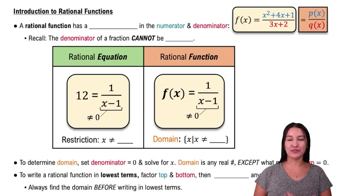Here are the essential concepts you must grasp in order to answer the question correctly.
Rational Functions
A rational function is a function that can be expressed as the ratio of two polynomials. In the case of f(x) = 5x/(x−4), the numerator is 5x and the denominator is (x−4). Understanding the structure of rational functions is essential for analyzing their properties, including their domains.
Recommended video:
Intro to Rational Functions
Domain of a Function
The domain of a function refers to the set of all possible input values (x-values) for which the function is defined. For rational functions, the domain is typically all real numbers except where the denominator equals zero, as division by zero is undefined. Identifying these restrictions is crucial for determining the domain.
Recommended video:
Domain Restrictions of Composed Functions
Finding Restrictions
To find the domain of a rational function, one must identify values that make the denominator zero. For f(x) = 5x/(x−4), setting the denominator (x−4) to zero reveals that x cannot equal 4. Thus, the domain excludes this value, leading to the conclusion that the function is defined for all real numbers except x = 4.
Recommended video:
Restrictions on Rational Equations
 Verified step by step guidance
Verified step by step guidance Verified Solution
Verified Solution



 6:24m
6:24m